2019-2020学年格致中学高二上英语第一次测验
- 格式:docx
- 大小:53.83 KB
- 文档页数:13
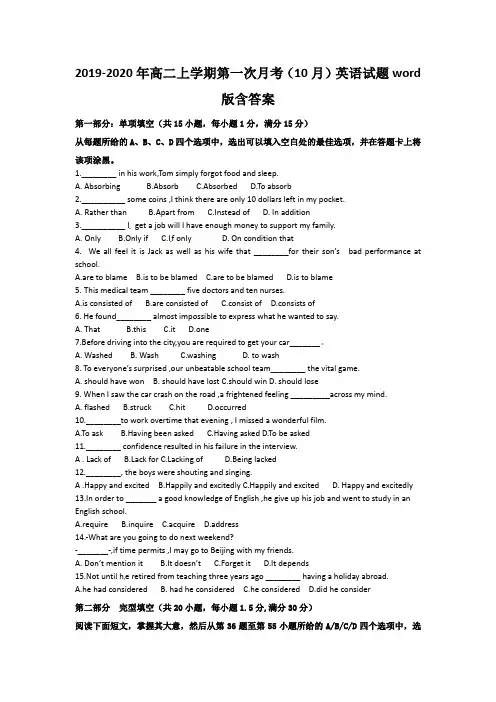
2019-2020年高二上学期第一次月考(10月)英语试题word版含答案第一部分:单项填空(共15小题,每小题1分,满分15分)从每题所给的A、B、C、D四个选项中,选出可以填入空白处的最佳选项,并在答题卡上将该项涂黑。
1.________ in his work,Tom simply forgot food and sleep.A. AbsorbingB.AbsorbC.AbsorbedD.To absorb2.__________ some coins ,I think there are only 10 dollars left in my pocket.A.Rather thanB.Apart fromC.Instead ofD. In addition3.__________ I get a job will I have enough money to support my family.A.OnlyB.Only ifC.I f onlyD. On condition that4.We all feel it is Jac k as well as his wife that ________for their son’s bad performance at school.A.are to blameB.is to be blamedC.are to be blamedD.is to blame5.This medical team ________ five doctors and ten nurses.A.is consisted ofB.are consisted ofC.consist ofD.consists of6. He found________ almost impossible to express what he wanted to say.A. ThatB.thisC.itD.one7.Before driving into the city,you are required to get your car_______。
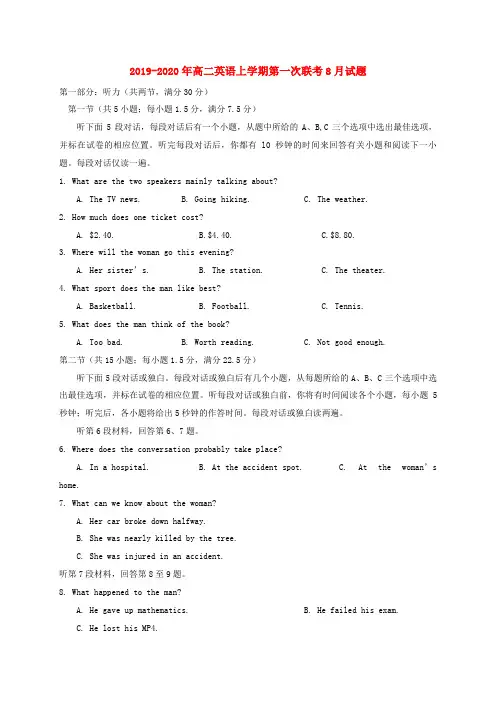
2019-2020年高二英语上学期第一次联考8月试题第一部分:听力(共两节,满分30分)第一节(共5小题;每小题1.5分,满分7.5分)听下面5段对话,每段对话后有一个小题,从题中所给的A、B,C三个选项中选出最佳选项,并标在试卷的相应位置。
听完每段对话后,你都有l0秒钟的时间来回答有关小题和阅读下一小题。
每段对话仅读一遍。
1. What are the two speakers mainly talking about?A. The TV news.B. Going hiking.C. The weather.2. How much does one ticket cost?A. $2.40.B.$4.40.C.$8.80.3. Where will the woman go this evening?A. Her sister’s.B. The station.C. The theater.4. What sport does the man like best?A. Basketball.B. Football.C. Tennis.5. What does the man think of the book?A. Too bad.B. Worth reading.C. Not good enough.第二节(共15小题;每小题1.5分,满分22.5分)听下面5段对话或独白。
每段对话或独白后有几个小题,从每题所给的A、B、C三个选项中选出最佳选项,并标在试卷的相应位置。
听每段对话或独白前,你将有时间阅读各个小题,每小题5秒钟;听完后,各小题将给出5秒钟的作答时间。
每段对话或独白读两遍。
听第6段材料,回答第6、7题。
6. Where does the conversation probably take place?A. In a hospital.B. At the accident spot.C. At the woman’s home.7. What can we know about the woman?A. Her car broke down halfway.B. She was nearly killed by the tree.C. She was injured in an accident.听第7段材料,回答第8至9题。
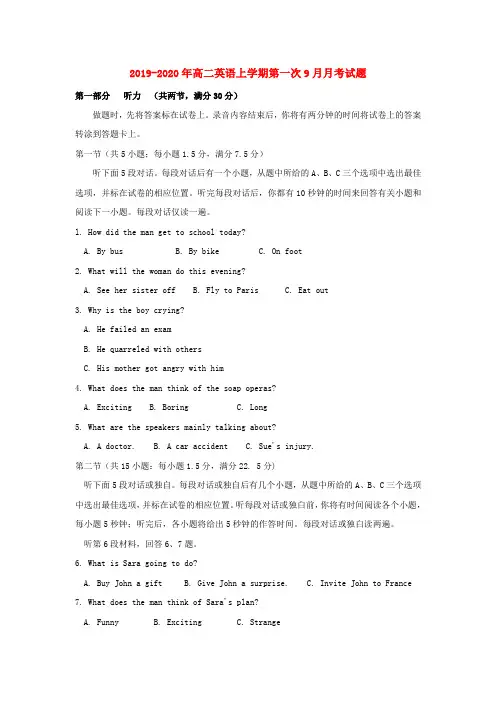
2019-2020年高二英语上学期第一次9月月考试题第一部分听力(共两节,满分30分)做题时,先将答案标在试卷上。
录音内容结束后,你将有两分钟的时间将试卷上的答案转涂到答题卡上。
第一节(共5小题;每小题1.5分,满分7.5分)听下面5段对话。
每段对话后有一个小题,从题中所给的A、B、C三个选项中选出最佳选项,并标在试卷的相应位置。
听完每段对话后,你都有10秒钟的时间来回答有关小题和阅读下一小题。
每段对话仅读一遍。
l. How did the man get to school today?A. By busB. By bikeC. On foot2. What will the woman do this evening?A. See her sister offB. Fly to ParisC. Eat out3. Why is the boy crying?A. He failed an examB. He quarreled with othersC. His mother got angry with him4. What does the man think of the soap operas?A. ExcitingB. BoringC. Long5. What are the speakers mainly talking about?A. A doctor.B. A car accidentC. Sue's injury.第二节(共15小题:每小题1.5分,满分22. 5分)听下面5段对话或独自。
每段对话或独自后有几个小题,从题中所给的A、B、C三个选项中选出最佳选项,并标在试卷的相应位置。
听每段对话或独白前,你将有时间阅读各个小题,每小题5秒钟;听完后,各小题将给出5秒钟的作答时间。
每段对话或独白读两遍。
听第6段材料,回答6、7题。
6. What is Sara going to do?A. Buy John a giftB. Give John a surprise.C. Invite John to France7. What does the man think of Sara's plan?A. FunnyB. ExcitingC. Strange听第7段材料,回答第8、9题。
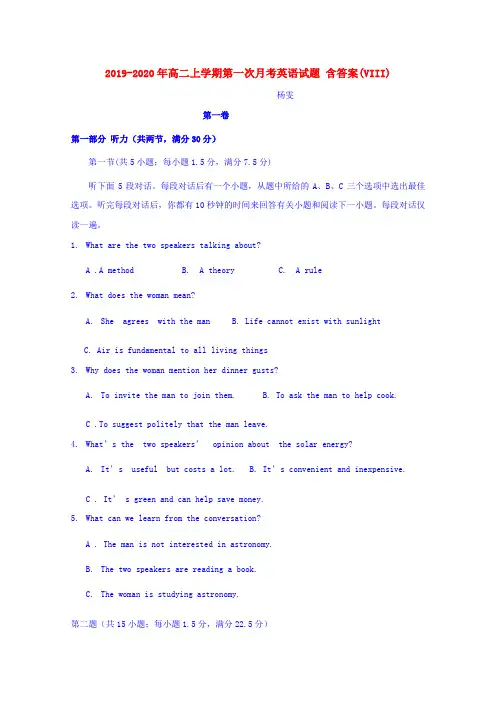
2019-2020年高二上学期第一次月考英语试题含答案(VIII)杨雯第一卷第一部分听力(共两节,满分30分)第一节(共5小题;每小题1.5分,满分7.5分)听下面5段对话。
每段对话后有一个小题,从题中所给的A、B、C三个选项中选出最佳选项。
听完每段对话后,你都有10秒钟的时间来回答有关小题和阅读下一小题。
每段对话仅读一遍。
1.What are the two speakers talking about?A .A method B. A theory C. A rule2.What does the woman mean?A.She agrees with the manB. Life cannot exist with sunlightC. Air is fundamental to all living things3.Why does the woman mention her dinner gusts?A.To invite the man to join them.B. To ask the man to help cook.C .To suggest politely that the man leave.4.What’s the two speakers’ opinion about the solar energy?A.It’s useful but costs a lot.B. It’s convenient and inexpensive.C . It’ s green and can help save money.5.What can we learn from the conversation?A . The man is not interested in astronomy.B.The two speakers are reading a book.C.The woman is studying astronomy.第二题(共15小题;每小题1.5分,满分22.5分)听下面5段对话或独白。
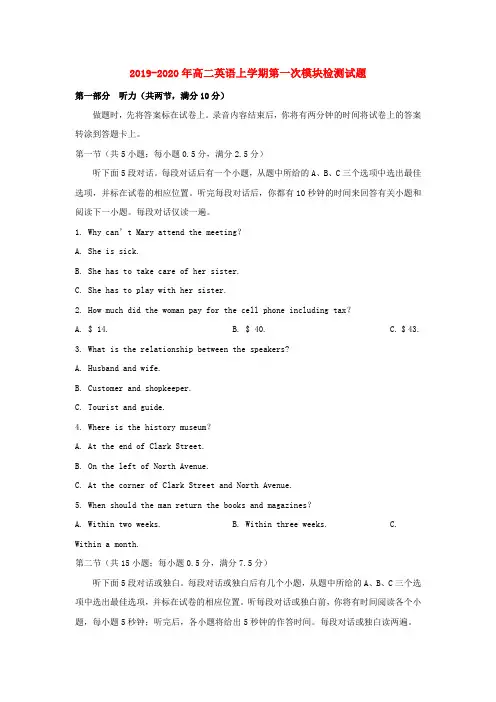
2019-2020年高二英语上学期第一次模块检测试题第一部分听力(共两节,满分10分)做题时,先将答案标在试卷上。
录音内容结束后,你将有两分钟的时间将试卷上的答案转涂到答题卡上。
第一节(共5小题;每小题0.5分,满分2.5分)听下面5段对话。
每段对话后有一个小题,从题中所给的A、B、C三个选项中选出最佳选项,并标在试卷的相应位置。
听完每段对话后,你都有10秒钟的时间来回答有关小题和阅读下一小题。
每段对话仅读一遍。
1. Why can’t Mary attend the meeting?A. She is sick.B. She has to take care of her sister.C. She has to play with her sister.2. How much did the woman pay for the cell phone including tax?A. $ 14.B. $ 40.C. $ 43.3. What is the relationship between the speakers?A. Husband and wife.B. Customer and shopkeeper.C. Tourist and guide.4. Where is the history museum?A. At the end of Clark Street.B. On the left of North Avenue.C. At the corner of Clark Street and North Avenue.5. When should the man return the books and magazines?A. Within two weeks.B. Within three weeks.C. Within a month.第二节(共15小题;每小题0.5分,满分7.5分)听下面5段对话或独白。
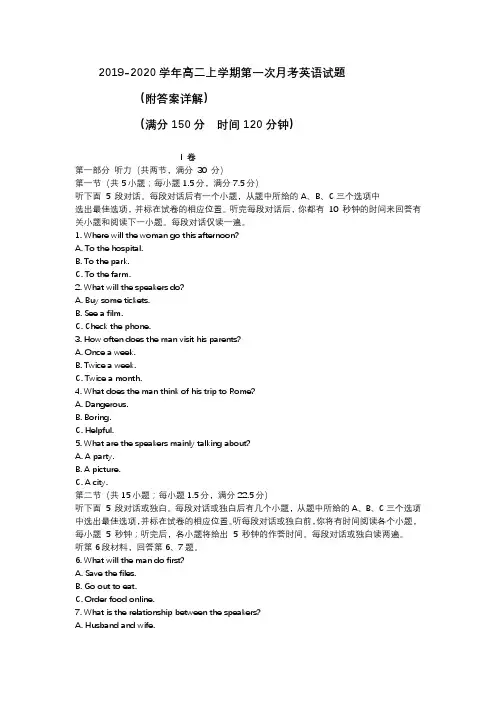
2019-2020学年高二上学期第一次月考英语试题(附答案详解)(满分150分时间120分钟)I 卷第一部分听力(共两节,满分30 分)第一节(共5小题;每小题1.5分,满分7.5分)听下面5 段对话。
每段对话后有一个小题,从题中所给的A、B、C三个选项中选出最佳选项,并标在试卷的相应位置。
听完每段对话后,你都有10 秒钟的时间来回答有关小题和阅读下一小题。
每段对话仅读一遍。
1. Where will the woman go this afternoon?A. To the hospital.B. To the park.C. To the farm.2. What will the speakers do?A. Buy some tickets.B. See a film.C. Check the phone.3. How often does the man visit his parents?A. Once a week.B. Twice a week.C. Twice a month.4. What does the man think of his trip to Rome?A. Dangerous.B. Boring.C. Helpful.5. What are the speakers mainly talking about?A. A party.B. A picture.C. A city.第二节(共15小题;每小题1.5分,满分22.5分)听下面5 段对话或独白。
每段对话或独白后有几个小题,从题中所给的A、B、C三个选项中选出最佳选项,并标在试卷的相应位置。
听每段对话或独白前,你将有时间阅读各个小题,每小题5 秒钟;听完后,各小题将给出5 秒钟的作答时间。
每段对话或独白读两遍。
听第6段材料,回答第6、7题。
6. What will the man do first?A. Save the files.B. Go out to eat.C. Order food online.7. What is the relationship between the speakers?A. Husband and wife.B. Fellow workers.C. Roommates.听第7段材料,回答第8、9题。
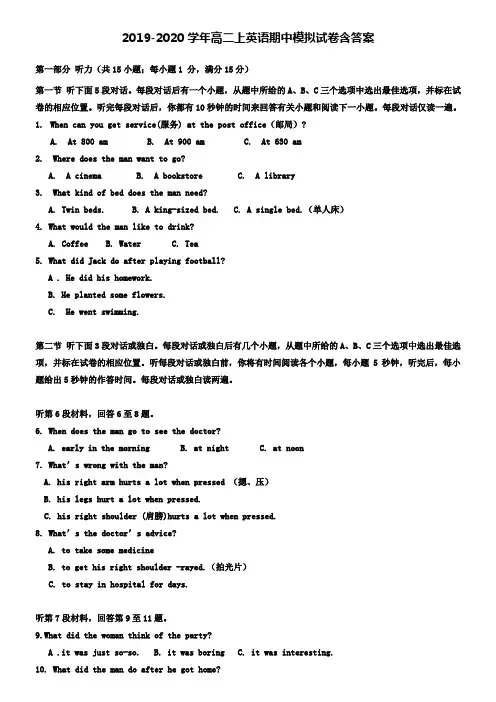
2019-2020学年高二上英语期中模拟试卷含答案第一部分听力(共15小题;每小题1 分,满分15分)第一节听下面5段对话。
每段对话后有一个小题,从题中所给的A、B、C三个选项中选出最佳选项,并标在试卷的相应位置。
听完每段对话后,你都有10秒钟的时间来回答有关小题和阅读下一小题。
每段对话仅读一遍。
1.When can you get service(服务) at the post office(邮局)?A. At 800 amB. At 900 amC. At 630 am2. Where does the man want to go?A. A cinemaB. A bookstoreC. A library3. What kind of bed does the man need?A. Twin beds.B. A king-sized bed.C. A single bed.(单人床)4. What would the man like to drink?A. CoffeeB. WaterC. Tea5. What did Jack do after playing football?A . He did his homework.B. He planted some flowers.C. He went swimming.第二节听下面3段对话或独白。
每段对话或独白后有几个小题,从题中所给的A、B、C三个选项中选出最佳选项,并标在试卷的相应位置。
听每段对话或独白前,你将有时间阅读各个小题,每小题5秒钟,听完后,每小题给出5秒钟的作答时间。
每段对话或独白读两遍。
听第6段材料,回答6至8题。
6. When does the man go to see the doctor?A. early in the morningB. at nightC. at noon7. What’s wrong with the man?A. his right arm hurts a lot when pressed (摁、压)B. his legs hurt a lot when pressed.C. his right shoulder (肩膀)hurts a lot when pressed.8. What’s the doctor’s advice?A. to take some medicineB. to get his right shoulder -rayed.(拍光片)C. to stay in hospital for days.听第7段材料,回答第9至11题。
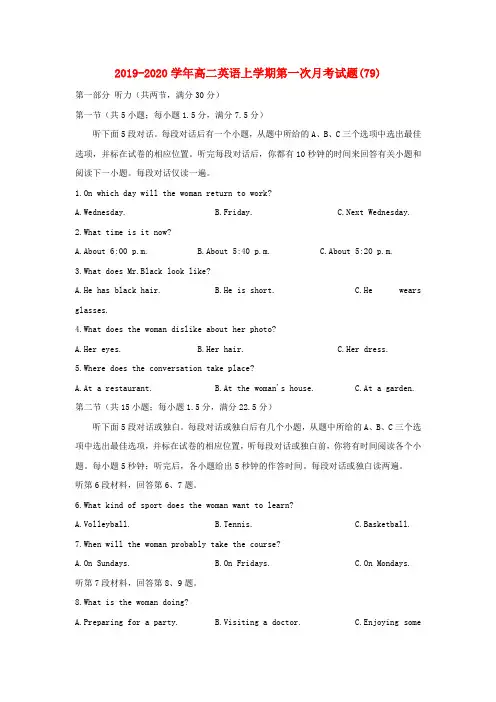
2019-2020学年高二英语上学期第一次月考试题(79)第一部分听力(共两节,满分30分)第一节(共5小题;每小题1.5分,满分7.5分)听下面5段对话。
每段对话后有一个小题,从题中所给的A、B、C三个选项中选出最佳选项,并标在试卷的相应位置。
听完每段对话后,你都有10秒钟的时间来回答有关小题和阅读下一小题。
每段对话仅读一遍。
1.On which day will the woman return to work?A.Wednesday.B.Friday.C.Next Wednesday.2.What time is it now?A.About 6:00 p.m.B.About 5:40 p.m.C.About 5:20 p.m.3.What does Mr.Black look like?A.He has black hair.B.He is short.C.He wears glasses.4.What does the woman dislike about her photo?A.Her eyes.B.Her hair.C.Her dress.5.Where does the conversation take place?A.At a restaurant.B.At the woman's house.C.At a garden. 第二节(共15小题;每小题1.5分,满分22.5分)听下面5段对话或独白。
每段对话或独白后有几个小题,从题中所给的A、B、C三个选项中选出最佳选项,并标在试卷的相应位置,听每段对话或独白前,你将有时间阅读各个小题。
每小题5秒钟;听完后,各小题给出5秒钟的作答时间。
每段对话或独白读两遍。
听第6段材料,回答第6、7题。
6.What kind of sport does the woman want to learn?A.Volleyball.B.Tennis.C.Basketball.7.When will the woman probably take the course?A.On Sundays.B.On Fridays.C.On Mondays. 听第7段材料,回答第8、9题。
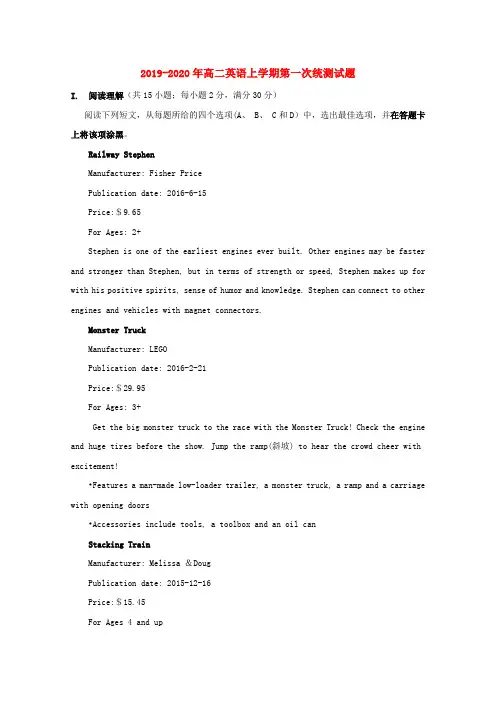
2019-2020年高二英语上学期第一次统测试题I. 阅读理解(共15小题;每小题2分,满分30分)阅读下列短文,从每题所给的四个选项(A、 B、 C和D)中,选出最佳选项,并在答题卡上将该项涂黑。
Railway StephenManufacturer: Fisher PricePublication date: 2016-6-15Price:$9.65For Ages: 2+Stephen is one of the earliest engines ever built. Other engines may be faster and stronger than Stephen, but in terms of strength or speed, Stephen makes up for with his positive spirits, sense of humor and knowledge. Stephen can connect to other engines and vehicles with magnet connectors.Monster TruckManufacturer: LEGOPublication date: 2016-2-21Price:$29.95For Ages: 3+Get the big monster truck to the race with the Monster Truck! Check the engine and huge tires before the show. Jump the ramp(斜坡) to hear the crowd cheer with excitement!•Features a ma n-made low-loader trailer, a monster truck, a ramp and a carriage with opening doors•Accessories include tools, a toolbox and an oil canStacking TrainManufacturer: Melissa &DougPublication date: 2015-12-16Price:$15.45For Ages 4 and upThe brightly colored wooden train is over 17 inches long and includes 15 changeable pieces. The engine and multicolored goods cars have strong pegs(挂钩) for linking the cars. Get onboard for a high-quality, value-packed adventure!Crazy FortsManufacturer: Crazy FortsPublication date: 2016-8-9Price:$44.95For Ages 5 and upChildren of all ages love building fun structures where they can play endlessly in their imaginary worlds. And Crazy Forts makes play so easy and so fun. Simply connect the balls and sticks and cover the structure with bed sheets to create your imaginary places. They are durable, portable and best of all, there are no batteries required! You can build your own creation, a playhouse for parties, tunnels or connect with friends for amazing structures.1. Buy the Monster Truck, and you will get ________.A. fun building structuresB. a wooden train with many piecesC. huge tires, a toolbox and an oil canD. magnet connectors to connect other vehicles2. If John Smith pays $15.45, he will get a product which has ________.A. portable balls and sticksB. hooks to connect other carsC. a ramp and a carriageD. a faster and stronger engines3. Which of the following can better promote children’s imagination?A. Stacking Train .B. Monster Truck.C. Railway Stephen.D. Crazy Forts.BI got invited to go with some friends to a game at another school. A senior will be driving us, and I think she’s a good driver, but it’s someone my parents don’t know. I want to tell my parents where I’m going, but what if I ask and they say“no”? I’ll end up wishing I never mentioned it and just went ahead and did it anyway.If you want permission, it’s best to build a track record of honesty and trust. Letting a parent kno w where you’re going is always a good idea.You may worry that telling your parents puts you at risk of getting “no” for an answer. But there’s a good chance your parents might be OK with you going. If you go but don’t tell them,you risk losing something more important —your parents’ trust.Parents who find out their kids did something behind their backs may be less likely to give permission to do things in the future. When trust is broken like this, parents wonder if teens are trying to hide something —and what they imagine can be far worse than the reality.Before you talk to your parents about the game, think about which approach will help them feel most fortable with giving you more freedom. Maybe they’d like to meet the person driving or talk to friends who have driven with her in the past. If your parents have questions or hesitate about letting you go, find out what their worries are and then do your best to answer them.4. From Paragraph 1 we know that the writer _________.A. appears nervousB. looks worriedC. feels confusedD. seems discouraged5. What is the best way to get parents’ permission according to the passage?A. To get more attention from them.B. To risk gaining their permission.C. To keep off the track of reality.D. To be honest and win their trust.6. What does the writer really want to tell us?A. How to win over parents.B. How to deal with strict parents.C. Which effective approach to use.D. How to get freedom from parents.7. Who do you think the passage is intended for?A. Parents.B. Friends.C. Drivers.D.CCareer success could be predicted as early as kindergarten, according to a 20-year study recently published in the American Journal of Public Health.Researchers from Pennsylvania State University and Duke University tracked more than 700 children from across the US between kindergarten and age 25 and found a significant correlation(相关性) between their social skills as kindergartners and their success as adults two decades later.In 1991, teachers assessed how the kindergartners interacted with each other socially using a range of criteria like whether they cooperate with their peers without prompting(激励), if they're helpful to others, whether they're good at understanding feelings, and if they can solve problems on their own.Researchers then kept track of whether the students went on to graduate high school on time, get a college degree, and find and keep a full-time job by 25. They also monitored the participants' involvement with crime, drug abuse, public assistance, and mental health issues.The results showed that socially petent children were far more likely to earn a college degree and have a full-time job by 25 than those with limited social skills. Those with limited social skills also had a higher chance of getting arrested, binge (放纵) drinking, and applying for public housing.“This study shows that helping children develop social and emotional skills is one of the most important things we can do to prepare them for a healthy future," said Kristin Schubert, program director at the Robert Wood Johnson Foundation, which funded the research, in a release.“From an early age, these skills can determine whether a child goes to college or prison, and whether they end up employed or addicted." The good news, according to Damon Jones, lead author of the study, is that intervention(干预) at a young age can help improve social and emotional skills. “This research by itself doesn't prove that higher social petence can lead to better outes later on," he said. “But when bined with other research, it is clear that helping children develop these skills increases their chances of success in school, work,8. What has the 20-year study found?A. Most kindergartners can solve problems alone.B. Helpful children understand others feeling better.C. Outgoing children cooperate with their peers easily.D. Social skills play a key role in children's development.9. Paragraph 3 and 4 are mainly about?A. when the researchers began their studyB. how long it took to plete the studyC. how the researchers conducted the studyD. what factors were studied by the experts10.What should parents do to help their children to succeed according to Kristin Schubert?A. Teach them how to cooperate with others.B. Teach them some basic living skills.C. Tell them to keep off alcohol.D. Coach them in their lessons.11. The text makes very good sense to ____________.A. teenagersB. educatorsC. doctorsD. general readersDWhat about your performance at today’s class?Are you active enough to focus on the lessons? Nowadays it is mon to see students’ laziness and poor efficiency at class. And that is why schools across the world are trying to e up with solutions to keep students active. Some are replacing traditional classroom chairs with exercise balls or standing desks. At Ward Elementary School in Winston, North Carolina students have adopted a new program that requires riding fixed bikes while reading.‘Read and Ride’ is the creation of school counselor Scott Ertl, who came up with the idea while he was exercising and reading at the gym. Believing it would be a fun way to convince students to bee more active, he placed one in the corner ofhis classroom and encouraged them to use it during independent reading classes.It was so popular that Ertl decided to add more bikes and offer the Read and Ride program to the entire school. Today Ward Elementary has a dedicated exercise room filled with bikes that can be used by students while pleting their daily reading assignments.Besides making reading more fun, the program also helps students exercise at a fortable pace without the pressure that es with regular sports-related activities. It is also a perfect way to release energy during days when the weather is not helpful to outdoor activities. What is more important, however, are the program’s academic benefits. A year after Read and Ride was introduced at Ward Elementary School, students actively involved in the program demonstrated anastonishing83% reading proficiency. Those who had not taken advantage of the exercise bikes tested at a much lower, 41%.Of course there are many other programs which have got good results as ‘Read and Ride’. Though the substantial improvement in academic achievement cannot all be attributed to programs like ‘Read and Ride,’experts believe they are a significant contributor. That’s because studies have shown that physical activity stimulates (刺激)brain cells and helps prepare it for learning. So don’t be surprised to find more schools across the country will adopt “Read and Ride” for their students.12. What is the new program at Ward Elementary School?A. Kids excise balls in the classroom.B. Kids ride bikes when they are reading.C. Kids attend reading classes at the gym.D. Kids stand on the desks while reading.13. How do the students at Ward Elementary School benefit from the program?A. They exercise with high pressure.B. They bee more active in sports.C. They feel reading fun and learn better.D. They bee more independent in reading.14. Which of the following is the closest in the meaning to the underlined phrase in the last paragraph?A. be due toB. be occupied withC. be devoted toD. be addictedto15. What is the author's attitude towards this program?A. Neutral.B. Negative.C. Doubtful.D. Positive.II 阅读填空(共5小题;每小题2分,满分10分)根据短文内容,从短文后的七个选项中选出能填入空白处的最佳选项,并在答题卡上将该项涂黑。
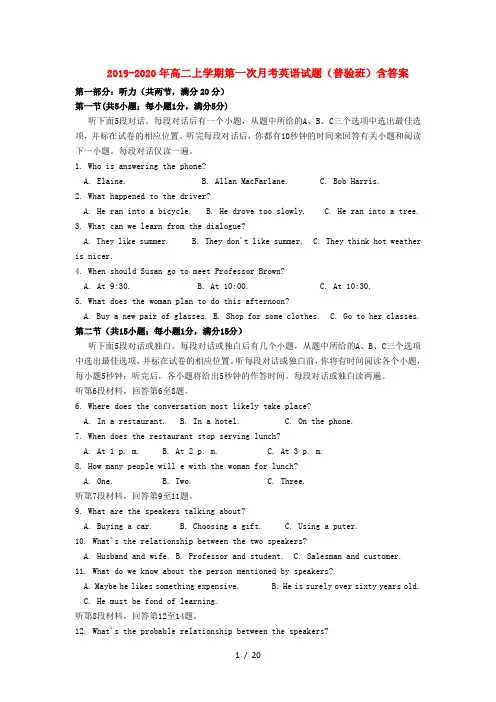
2019-2020年高二上学期第一次月考英语试题(普验班)含答案第一部分:听力(共两节,满分20分)第一节(共5小题;每小题1分,满分5分)听下面5段对话。
每段对话后有一个小题,从题中所给的A、B、C三个选项中选出最佳选项,并标在试卷的相应位置。
听完每段对话后,你都有10秒钟的时间来回答有关小题和阅读下一小题。
每段对话仅读一遍。
1. Who is answering the phone?A. Elaine.B. Allan MacFarlane.C. Bob Harris.2. What happened to the driver?A. He ran into a bicycle.B. He drove too slowly.C. He ran into a tree.3. What can we learn from the dialogue?A. They like summer.B. They don't like summer.C. They think hot weather is nicer.4. When should Susan go to meet Professor Brown?A. At 9:30.B. At 10:00.C. At 10:30.5. What does the woman plan to do this afternoon?A. Buy a new pair of glasses.B. Shop for some clothes.C. Go to her classes.第二节(共15小题;每小题1分,满分15分)听下面5段对话或独白。
每段对话或独白后有几个小题,从题中所给的A、B、C三个选项中选出最佳选项,并标在试卷的相应位置。
听每段对话或独白前,你将有时间阅读各个小题,每小题5秒钟;听完后,各小题将给出5秒钟的作答时间。
每段对话或独白读两遍。
二〇一九学年第一学期高二英语第一次测验第1 页 格致中学 二〇一九学年度第一学期第一次测验 高二年级 英语试卷(共11页) (测试100分钟内完成,总分100分,试后交答题卷)
友情提示:昨天,你既然经历了艰苦的学习,今天,你必将赢得可喜的收获! 祝你:诚实守信,沉着冷静,细致踏实,自信自强,去迎接胜利! 第I卷 I. Listening Comprehension (16%) Section A Directions: In Section A, you will hear ten short conversations between two speakers. At the end of each conversation, a question will be asked about what was said. The conversations and the questions will be spoken only once. After you hear a conversation and the question about it, read the four possible answers on your paper, and decide which one is the best answer to the question you have heard. 1. A. A salesperson. B. A teacher. C. A coach. D. A doctor. 2. A. In a hospital. B. At a bank. C. In a restaurant . D. At a clothes store. 3. A. Youngsters don’t really know what fashion is. B. People should care more about their appearance. C. Styles change more quickly than necessary nowadays. D. It’s not sensible to go after brand name clothing. 4. A. The man is concerned about critics’ comments on the show. B. The man believes that the woman’s paintings will sell well. C. The woman is confident in the sales of her paintings. D. The woman dreams of becoming a critic someday. 5. A. He didn’t expect to get full marks. B. He needs to find a new part-time job. C. The woman must have done well in the exam. D. The woman didn’t tell him anything about her job. 6. A. She is fully engaged. B. She doesn’t like parties. C. She has an invitation already. D. She questions the man’s purpose. 7. A. He was held up by the traffic jam. B. He failed to phone the woman’s secretary. C. He was a stranger to the place. D. He forgot where to meet the woman. 8. A. The man made a bad suggestion. B. The woman takes the man’s advice. C. The woman has taught Jim in a pleasant way. D. The man has spoiled the peaceful atmosphere. 9. A. Pointless. B. Out-of-date. C. Informative. D. Amusing. 10. A. The man forgot to go to the cinema with the woman. B. Both of the speakers enjoyed the film. C. An exciting film will be on next week. D. The woman was interested in space exploration.
Section B Directions: In Section B, you will hear two short passages and one longer conversation, and you will be asked
班级____________姓名________________学号____________准考证号______________ 二〇一九学年第一学期高二英语第一次测验第2 页
several questions on each of the passages and the conversations. The passages and the conversations will be read twice, but the questions will be spoken only once. When you hear a question, read the four possible answers on your paper and decide which one is the best answer to the question you have heard.
Questions 11 through 13 are based on the following passage. 11. A. His father seldom asked others to help with the work. B. He was considered to be able to take the responsibility. C. He was the first one to undertake the job in his family. D. His father gave him six dollars for his efforts. 12. A. His father scolded him severely. B. His father took back the money. C. His father made him redo the cutting. D. His father cut the leaves himself. 13. A. One can benefit a lot from working with his father. B. Manual laborers shouldn’t be looked down upon. C. One should always take his job seriously. D. Teenagers tend to be careless.
Questions 14 through 16 are based on the following passage. 14. A. The loss of their careers. B. The passing away of their friends. C. The failing of their memory. D. The decline of their physical health. 15. A. Both depend on genes. B. Both need some kind of exercise. C. Both have connections with thinking. D. Both can be enhanced without efforts. 16. A. It records users’ progress. B. It varies users’ muscle use. C. It offers users medical advice. D. It encourages users to give feedback.
II. Grammar and Vocabulary (19%) Section A (10%) Directions: After reading the passage below, fill in the blanks to make the passage coherent and grammatically correct. For the blanks with a given word, fill in each blank with the proper form of the given word; for the other blanks, use one word that best fits each blank. Does City Living Hurt Mental Health? People often move to cities (17)_____ better jobs and more cultural activities. But are they putting (18)_____ at risk? Maybe. Experts at the American Psychiatry Association say that “natural environments or green spaces” do much for good our mental health and (19)_____ (experience) nature helps people recover from the mental tiredness that comes from day-to-day work. On the other hand, (20)_____ they cannot say exactly why, mental health experts say some research suggests that city living might hurt our mental health. Andrea Mechelli is a doctor with the Institute of Psychiatry at Kings College, London. “There have been studies (21)_____ people were taken out of an urban environment into a rural environment, and their symptoms would improve. And we also see that the greater the city the greater the risk.” Kings College researchers, along with city planners and land and building designers hoped (22)_____ (learn) more about city living and mental illness. So, they created a smartphone app called Urban Mind. They say they